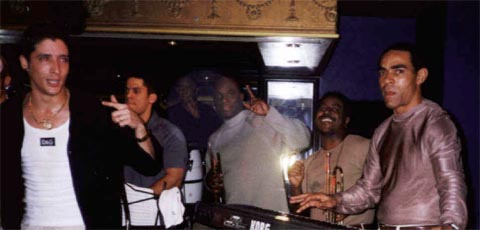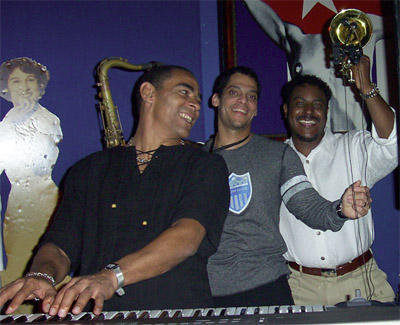Lo Nuevo[hide]
Resenas: Vacilón Santiaguero (Circle 9 ...
Staff: Bill Tilford
Fotos: Tom Ehrlich : 2024 Monterey Jazz, P...
Fotos: Tom Ehrlich : 2024 Monterey Jazz Fe...
Fotos: Tom Ehrlich : testing 123
Grupos: Pupy y los que S... : Discography - 1995- F...
Reportes: From The St... : Cubadisco 2...
Reportes: From The St... : Jazz Plaza ...
Fotos: Tom Ehrlich : Irakere 50th Annivers...
Fotos: Tom Ehrlich : Irakere
Resenas: Joey Altruda Presents: El Gran ...
Timbapedia: 09. Interviews -... : Carlos del Pino ...
Fotos: Tom Ehrlich : 2023 Monterey Jazz Fe...
Fotos: Tom Ehrlich : 2023 Monterey Jazz Fe...
Fotos Del Día [hide]
Entrevista - Luis Bu - Spring - 2000

Interview by Abel Robaina - photo by Duniel Deya
INTRODUCTION: Luis Bu Pascual has played with Manolín since the very beginning. He and Eduardo "Chaka" Nápoles alternate between piano and synth, with Luis playing synth about 80% of the time. Luis has arranged many of Manolín's most brilliant charts, including "Me Pasé de Copas", "Te Conozco Mascarita", "Somos lo que Hay" and many more. He currently lives in Miami where he plays with Manolín and various other groups, including Clave Ocho.
This interview was conducted by Abel Robaina in Spring of 2000 in Northern California.
Abel Robaina: When did you first start working with Manolín?
Luis Bu: Since the beginning. Five or six years ago, we started mixing Timba with Jazz, Rap and Salsa.

Joaquín "El Kid de la Salsa" Díaz, Guillermo Roig, Tómas Cruz (congas), Niche, Polledo, Luis Bu
photo by Maydoll Lazo
Abel Robaina: What is your definition of "Timba".
Luis Bu: Timba is just like Salsa, but with very strong AFro-Cuban accents and lots of influences from Funk and R&B dance music like James Brown, Earth, Wind and Fire and the Temptations. Cuban musicians love that kind of music. But we played with it and instead of always hitting the snare drum on "2" and "4", we do on "1" and "3" and sometimes we go back to "4" -- same with the bass. And we work out the harmony accordingly. That's very different from any Salsa that's being made here and our approach to horn arrangements is totally different from Salsa as well.
Abel Robaina: Do you think that what is happening in the Salsa scene in Cuba is better than what you've heard in the US, Puerto Rico and Colombia?
Luis Bu: Absolutely. They have created a cliche. All the arrangements and all the singers sound alike. I'm not trying to get in trouble with the famous names in Salsa -- I'm just suggesting and encouraging them to do something different since they have the possibility that the big record companies promote their recordings. Actually, I think they're stuck. You can hear the same break from this or that singer, and I don't want to mention any names, but it's always the same.
Abel Robaina: Where do you think Timba is going from this point in time?
Luis Bu: Musically, we're always going to move ahead. It's alwaysgoing to be great, but the problem with Timba is that it doesn't have a strong representation in the mainstream. It's still a product of a sub-culture. So, if you create music and nobody promotes it, nobody knows about it! Everbody who hears our music loves it. But few are willing to take the risk because they already have a formula that sells.

Luis Bu with Guillermo Roig and William Polledo
at Club Nostalgia, February, 2002
photo by Duniel Deya
Abel Robaina: Who do you consider to be your strongest influence in the Cuban scene today?
Luis Bu: These days, Cuban music is pretty crazy. There are a lot of different sonorities. A few great bands and alot of bands that copy the great ones. But anyway - my "school" was always a school of masters. The music I always heard was that of Irakere and the maestro Chucho Valdés. that was my biggest influence as an arranger. From the US, I was influenced by all the black music from the 70's, particularly Earth, Wind and Fire. These days in Cuba, my favorite is Issac Delgado. He's phenomenal because he's a link between Cuba and the world, and with the right promotion he'll be unstoppable. Manolín was the most popular musician in Cuba for six straight years -- everybody loved him and his shows were the most expensive. And Los Van Van is "el tren de Cuba" [the train of Cuba]. They've been there for 30 years and will continue to be there because of Juan Formell. He has that sonority and his arrangements and compositions are so fresh.
Abel Robaina: So do you think that if Formell quits that Los Van Van will disappear?
Luis Bu: I think if his place is taken by somebody who understands that sonority that they'll be able to go on.
Untitled Document
INTERVIEW WITH LUIS BU PASCUAL,
keyboardist and arranger

photo by Duniel Deya - Luis Bu with Jeáns Valdes and Guillermo Roig
Interview by Abel Robaina, Spring - 2000
INTRODUCTION: Luis Bu Pascual has played with Manolín since the very beginning. He and Eduardo "Chaka" Nápoles alternate between piano and synth, with Luis playing synth about 80% of the time. Luis has arranged many of Manolín's most brilliant charts, including "Me Pasé de Copas", "Te Conozco Mascarita", "Somos lo que Hay" and many more. He currently lives in Miami where he plays with Manolín and various other groups, including Clave Ocho.
This interview was conducted by Abel Robaina in Spring of 2000 in Northern California.
Abel Robaina: When did you first start working with Manolín?
Luis Bu: Since the beginning. Five or six years ago, we started mixing Timba with Jazz, Rap and Salsa.

Joaquín "El Kid de la Salsa" Díaz, Guillermo Roig, Tómas Cruz (congas), Niche, Polledo, Luis Bu
photo by Maydoll Lazo
Abel Robaina: What is your definition of "Timba".
Luis Bu: Timba is just like Salsa, but with very strong AFro-Cuban accents and lots of influences from Funk and R&B dance music like James Brown, Earth, Wind and Fire and the Temptations. Cuban musicians love that kind of music. But we played with it and instead of always hitting the snare drum on "2" and "4", we do on "1" and "3" and sometimes we go back to "4" -- same with the bass. And we work out the harmony accordingly. That's very different from any Salsa that's being made here and our approach to horn arrangements is totally different from Salsa as well.
Abel Robaina: Do you think that what is happening in the Salsa scene in Cuba is better than what you've heard in the US, Puerto Rico and Colombia?
Luis Bu: Absolutely. They have created a cliche. All the arrangements and all the singers sound alike. I'm not trying to get in trouble with the famous names in Salsa -- I'm just suggesting and encouraging them to do something different since they have the possibility that the big record companies promote their recordings. Actually, I think they're stuck. You can hear the same break from this or that singer, and I don't want to mention any names, but it's always the same.
Abel Robaina: Where do you think Timba is going from this point in time?
Luis Bu: Musically, we're always going to move ahead. It's alwaysgoing to be great, but the problem with Timba is that it doesn't have a strong representation in the mainstream. It's still a product of a sub-culture. So, if you create music and nobody promotes it, nobody knows about it! Everbody who hears our music loves it. But few are willing to take the risk because they already have a formula that sells.

Luis Bu with Guillermo Roig and William Polledo
at Club Nostalgia, February, 2002
photo by Duniel Deya
Abel Robaina: Who do you consider to be your strongest influence in the Cuban scene today?
Luis Bu: These days, Cuban music is pretty crazy. There are a lot of different sonorities. A few great bands and alot of bands that copy the great ones. But anyway - my "school" was always a school of masters. The music I always heard was that of Irakere and the maestro Chucho Valdés. that was my biggest influence as an arranger. From the US, I was influenced by all the black music from the 70's, particularly Earth, Wind and Fire. These days in Cuba, my favorite is Issac Delgado. He's phenomenal because he's a link between Cuba and the world, and with the right promotion he'll be unstoppable. Manolín was the most popular musician in Cuba for six straight years -- everybody loved him and his shows were the most expensive. And Los Van Van is "el tren de Cuba" [the train of Cuba]. They've been there for 30 years and will continue to be there because of Juan Formell. He has that sonority and his arrangements and compositions are so fresh.
Abel Robaina: So do you think that if Formell quits that Los Van Van will disappear?
Luis Bu: I think if his place is taken by somebody who understands that sonority that they'll be able to go on.






















